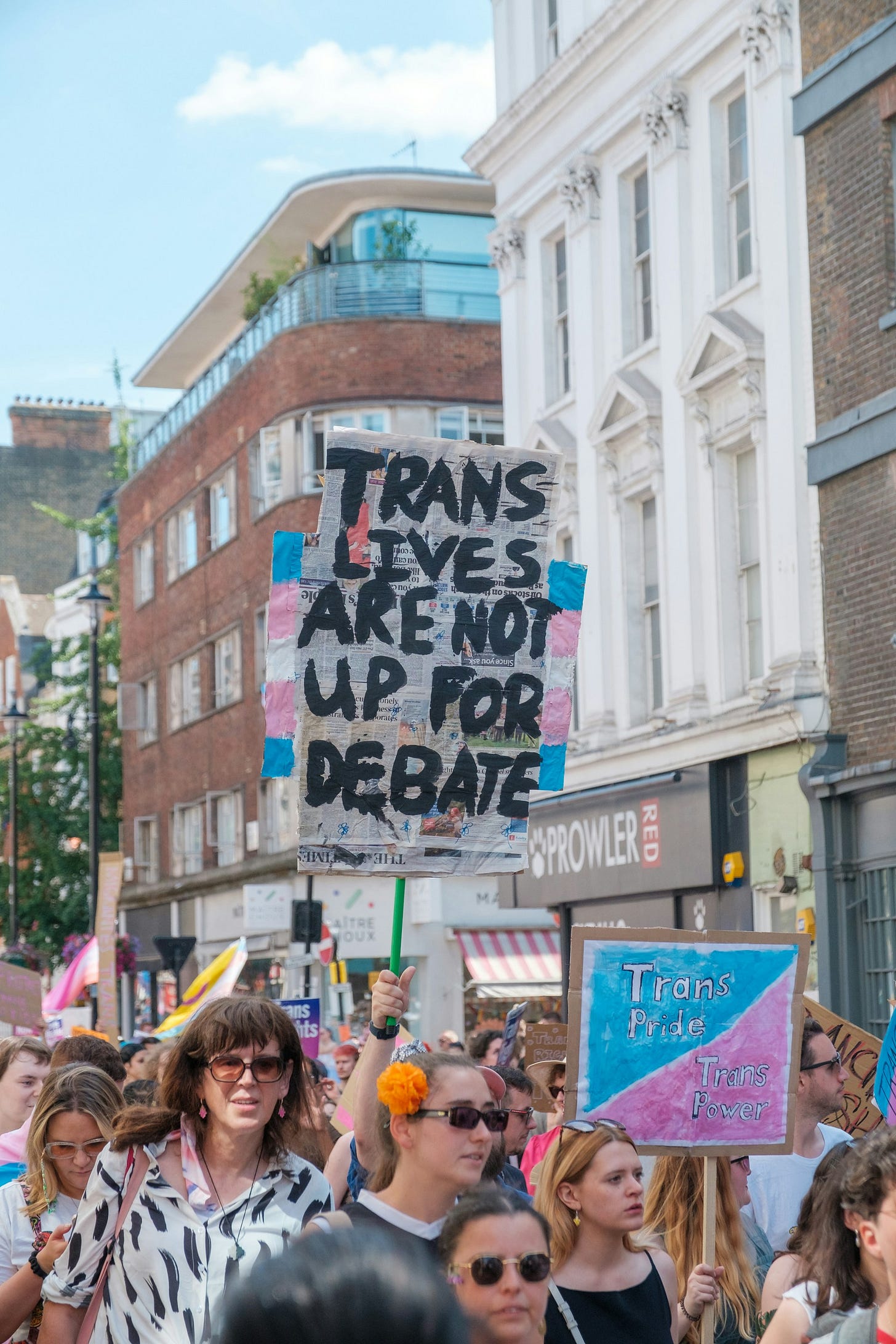Photo by Thiago Rocha on Unsplash
Protest, Part 3: What Courage Looks Like
Dear Seized Readers,
How is the weather where you live?
The sun is bright here in Central North Carolina, and spring is beginning. From outside my writing room window, I see the Autumn Alice cherry putting on its annual show of pastel blossoms. This leads me to think about authenticity. The cherry tree is thriving, being its true self.
In contrast to the natural world, people are unable to thrive when they don’t feel natural within their own bodies. Transitioning into a different gender becomes critical to authenticity and well-being. Courageous trans brothers and sisters reflect in their changed bodies who their spirits are called to be. The verse of trans poets strikes an emotional chord, enacts how their transitioning is crucial to happiness and self-fulfillment. This poetry also fights back against the anti-trans sentiment which is particularly loud and ugly in our nation at present.
Book reviewer Rebecca Foster, in her review of Transgenesis by Jewish trans poet Ava Nathaniel Winter, includes these lines from Winter’s closing poem, “Lament with Cello Accompaniment:” I do not choose the sound of the song // In my mouth, the fading taste of what I still live through, but I choose this future, / as I bury a name defined by grief as I enter the silence where my voice will take / shape.
Photo by Philippe Bout on Unsplash
For me, these aching lines by Winter convey the pain of feeling alien and trapped within one’s given body—a name defined by grief, of conveying a gender along with the expectations that come with it to the world while enduring the sorrow of the physical self not reflecting one’s inner identity. A true voice can’t take shape without the authentic body to internalize its music.
Our current administration has negated the humanity of our trans friends, neighbors, and family members. The present moment calls for action on their behalf.
Today’s post shares two powerful poems by trans poets.
Photo by Diana Ewell Engel
My Trans Body See and hear Espinoza read “My Trans Body.” I pick up the phone and send you some words/ about my trans body. They float across America/ and are careful not to touch anything between us or worry about who sees them. They just/ crackle and spin and soar through the air/ observing scenes of everyday events— many birds moving like a single animal,/ trees swaying in place,/ men being men to everything’s detriment. When you hear my words it reminds me/ I’m solid matter. In some sense I am/ the daydream of an alternate universe. In another sense I am far too present here./ I say look at my shoulders, look at all I carry,/ but all anyone sees is their shape. No one hears what my legs do or remembers/ how I built them from nothing./ How I trudged through the dull grey shit of a gendered life until I could no longer take it./ They make movies about us being sad/ and dying but they never talk about what it is for us to be alive,/ to love life so much we choose this brokenness/ just to have the smallest taste of it. I’m not trying to play with your emotions./ I don’t want to be your inspirational object./ I’m saying I am here now, embrace me or get out of my way. I have big plans./ They involve staying alive. They involve/ claiming my space and never being quiet again. Joshua Jennifer Espinoza, from her book, Outside of the Body There Is Something Like Hope. The text of this poem can be found on the Paris Review website: December 6, 2018 article, “Poetry RX: You Are the Penultimate Love of My Life,” by Sarah Kay.
Photo by Trevor John Williams on Unsplash
Joshua Jennifer Espinoza bares herself in “My Trans Body.” She helps those of us who are cisgender feel her pain. Her well-conceived, beautiful metaphors of “everyday” life, the “many birds moving like a single animal,” and “trees swaying in place,” relate, for me, how nature works as a community in contrast to humankind which conquers and colonizes. Espinoza’s protest arrives at the end via a strong declaration of self.
African trans poet Adunni Tiwatope conveys fury in her poem that follows, “Tone It Down.” Tiwatope advocates for trans rights in Lagos, Nigeria. She is the programs director at a trans center, “Femme Hive.” Tilewa Kazeem in her SERVICE95 article, “How The FemmeHive Project Is Providing Hope For The Trans Community In Nigeria,” explains how this center provides “community, empowerment, and support” for trans women in Nigeria. While it is frightening to be trans, particularly now in the United States, it is a terrifying predicament in Africa.
Photo by Alexey Demidov on Unsplash
TONE IT DOWN Just the exact way you say it to remind us of outdoing the box,/ An imposing call to order,/ reminding us that we might just be doing too much./ After all, we paid dues with our heads buried under the waters/ And dreams dying in thoughts./ Yet, we are advised to TONE IT DOWN!/ Denying ourselves of existing at their comfort,/ While we are made aliens in our birthplace, homes and even to ourselves./ They say, the more the normality, the better the acceptance./ We have been taught to/ HATE who we are,/ BE AFRAID of what we’ve become/ and BEAT DOWN at anything that takes our form./ They say you do not have to be out and loud/ but you, you… While you stay flourishing in the regretful corner of your heart,/ your freedom is to impose restricting opinions on our expression of self./ For what we love, who we are, brings us together and so that same…/ the same is the joy to exist differently and free./ How so sweet to consider our safety/ but it’s not in our position to apologize/ when they are not close to comfort with our lives. -Adunni The text of this poem is available on the TransLash website.
Photo by Ehimetalor Akhere Unuabona on Unsplash










Love these lines:
“they never talk about
what it is for us
to be alive,/
to love life so much
we choose this brokenness/
just to have the smallest
taste of it.”
🩵🩷🤍